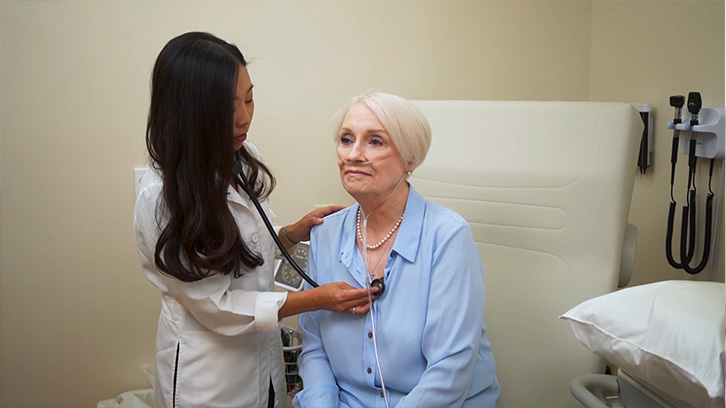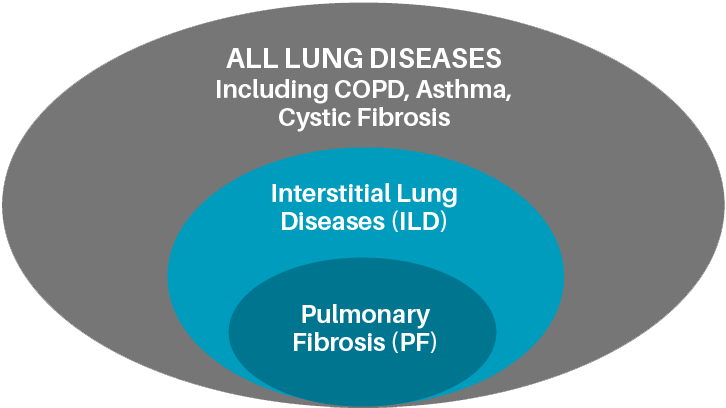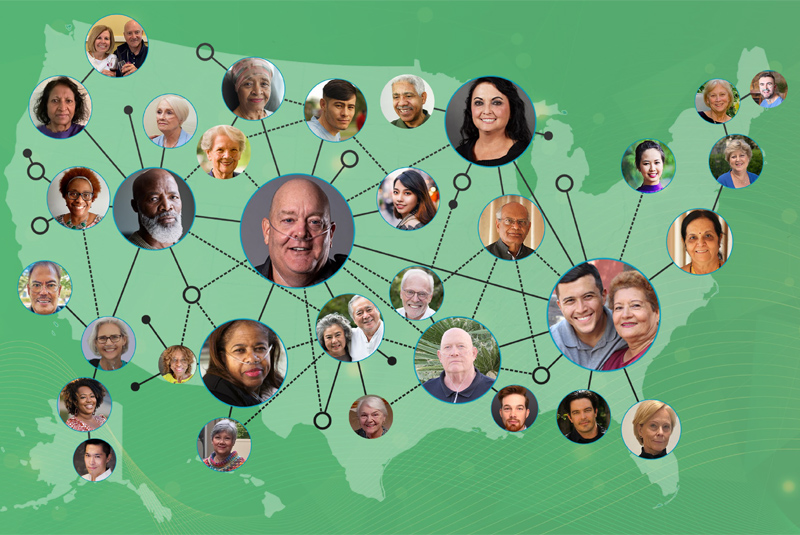What is pulmonary fibrosis?

Newly diagnosed with PF? Start here
If you're newly diagnosed with pulmonary fibrosis, we reccommend you begin your learning journey with our in-depth information series, PF Basics: Info for newly diagnosed patients.
Right now, the most important thing we want you to remember is that you’re not alone. The PFF is here for you at every stage of your journey. We can also connect you with other people who have this disease so that you can feel supported and heard.
If you, your family members, or your friends have questions, please call the PFF Help Center at 1.844.825.5733 or email us at help@pulmonaryfibrosis.org.
Continue scrolling and reading through this page for a brief overview of PF. For a more in-depth overview, refer to PF Basics: Info for newly diagnosed patients.
What does "pulmonary fibrosis" mean?
The word “pulmonary” means lung and the word “fibrosis” means scar tissue— similar to scars that form on the skin from an old injury or surgery. Pulmonary fibrosis (PF) is a process that causes lung scarring, in which fibrotic tissue blocks the movement of oxygen from inside the tiny air sacs in the lungs into the bloodstream. Low oxygen levels (and the stiff scar tissue itself) can cause people who have pulmonary fibrosis to feel short of breath, particularly when walking and exercising.


Interstitial lung disease and pulmonary fibrosis
Pulmonary fibrosis isn’t just one disease. It is a family of more than 200 different lung diseases that all look very much alike. The PF family of lung diseases is part of an even larger group of diseases called interstitial lung diseases (also known as ILD), which includes all of the diseases that have inflammation and/or lung scarring. In ILDs, it is the walls of the air sacs of the lung, and the tissue and space around these air sacs, where the injury and damage occur. Some interstitial lung diseases don’t include lung scarring. When an interstitial lung disease does include scar tissue in the lung, we call it pulmonary fibrosis.
Pulmonary fibrosis and interstitial lung disease statistics

Causes of PF
Progression of pulmonary fibrosis
As the lung scarring in PF progresses, breathing becomes more difficult with increased demand for higher flows of oxygen. This demand for more oxygen may cause increased breathlessness, particularly with activity, and anxiety. Patients may also experience an increase in other associated symptoms as their disease progresses such as cough, fatigue, and deconditioning.


What researchers are doing to help
The Pulmonary Fibrosis Foundation is leading the fight by funding promising research and we need your help.
One of our key research programs is the PFF Community Registry. We invite eligible participants to join by completing a series of simple surveys. Your survey responses will be used by researchers to better understand how PF and ILD progress over time, respond to treatments, and how the diseases affect individuals. The more individuals who join and provide responses, the closer we come to a cure.
Eligible participants include:
- Patients living with PF and ILD
- Lung transplant recipients who have had PF or ILD
- Caregivers and biological family members of patients with PF or ILD, including those who have passed away
Enrolling in the PFF Community Registry is entirely online. All you need is internet access. Learn more about this groundbreaking program by visiting the PFF Community Registry homepage.
Educational Materials
Find reliable information and trusted resources that can help you learn about pulmonary fibrosis and live better with PF.
-
View Full Details
Pulmonary Fibrosis Quick Facts
This one-page document provides quick facts about pulmonary fibrosis, including symptoms, causes, treatment options, and more. -
View Full Details
Pulmonary Fibrosis Information Guide
Our comprehensive guide provides reliable information about pulmonary fibrosis, the diagnostic process, treatment options, and more.

PFF Help Center
For those living with pulmonary fibrosis, obtaining the most accurate and current information can be a frustrating and challenging task. Let us help you find your answers.
Find a doctor or a PF support group
The Pulmonary Fibrosis Foundation is pleased to offer this search tool to help you find expert pulmonologists (lung doctors) and support groups in your area. Each medical center listed is an official PFF Care Center Network site, providing expert care for people living with pulmonary fibrosis. Further, more than 150 PF support groups are welcoming new members, with many of them meeting virtually. You may also join one of the PFF's four official support groups on Zoom.
To quickly find resources in your area, use the search feature below by entering your zip code. Use the checkboxes to filter results.
Please email help@pulmonaryfibrosis.org or call 844.TalkPFF with any further
questions.
